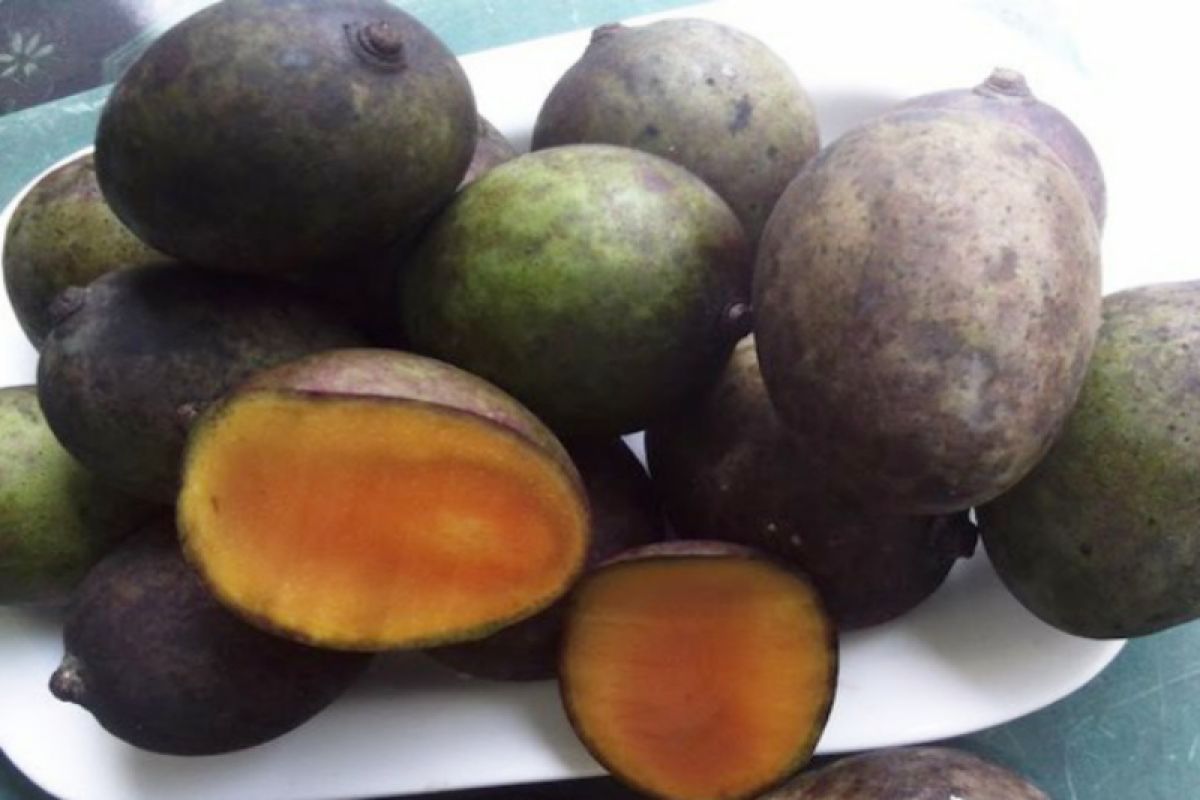South Kalimantan has a flora mascot, Kasturi fruit, whose conservation status was declared extinct by the world conservation International Union for Conservation of Nature (IUCN).
A typical fruit park was recently established by the name Taman Buah Lokal Mekar Lestari in the tourism village of Muara Kanoco, Anjir Muara Sub-district, Barito Kuala Regency, to conserve Kasturi together with various endemic fruits.
"Kasturi is a type of mango that has become extinct in the wild. This is the reason that we are trying to preserve it," said Amalia Rezeki, the initiator of Mekar Lestari Local Fruit Garden, Wednesday (Jan 13, 2021).
Kasturi is small in size with a thin light green rind with dark spots. When ripe, the skin turns blackish purple. While the flesh of the fruit is dark orange, sweet taste and fragrant aroma, so many people of South Kalimantan like it.
Amalia said the Kasturi trees can grow big makes it difficult to plant in the house yard, like mango in general.
Read also: A closer look at Bekantan's life in Curiak Island, South Kalimantan
The biodiversity, especially fruit, in Muara Kanoco Village has inspired Amelia to preserve the typical fruit of South Kalimantan. Besides kasturi, there are also mango types of kuini, hambawang, hampalam damar or sapat, also Santol fruit and guava bol, breadfruit, and balangkasua or locally known as grape of Banjar people (South Kalimantan).
"The tourism village, in which local fruits are preserved, is community-based managed by upholding local wisdom which in turn to improve the economy of local people," she said.
Amalia, who is also chairperson of Sahabat Bekantan Indonesia (SBI) Foundation, initiated the Muara Kanoco Tourism Village and at the same time wants to develop a global special interest tourism area on the cost of Barito River. It is close to the Bekantan Research Station on Curiak Island, Barito Kuala.
Read also: Journey to save South Kalimantan orangutan quite long: SBI
Read also: ULM researchers create innovative food from kelakai
COPYRIGHT © ANTARA News Kalimantan Selatan 2021
A typical fruit park was recently established by the name Taman Buah Lokal Mekar Lestari in the tourism village of Muara Kanoco, Anjir Muara Sub-district, Barito Kuala Regency, to conserve Kasturi together with various endemic fruits.
"Kasturi is a type of mango that has become extinct in the wild. This is the reason that we are trying to preserve it," said Amalia Rezeki, the initiator of Mekar Lestari Local Fruit Garden, Wednesday (Jan 13, 2021).
Kasturi is small in size with a thin light green rind with dark spots. When ripe, the skin turns blackish purple. While the flesh of the fruit is dark orange, sweet taste and fragrant aroma, so many people of South Kalimantan like it.
Amalia said the Kasturi trees can grow big makes it difficult to plant in the house yard, like mango in general.
Read also: A closer look at Bekantan's life in Curiak Island, South Kalimantan
The biodiversity, especially fruit, in Muara Kanoco Village has inspired Amelia to preserve the typical fruit of South Kalimantan. Besides kasturi, there are also mango types of kuini, hambawang, hampalam damar or sapat, also Santol fruit and guava bol, breadfruit, and balangkasua or locally known as grape of Banjar people (South Kalimantan).
"The tourism village, in which local fruits are preserved, is community-based managed by upholding local wisdom which in turn to improve the economy of local people," she said.
Amalia, who is also chairperson of Sahabat Bekantan Indonesia (SBI) Foundation, initiated the Muara Kanoco Tourism Village and at the same time wants to develop a global special interest tourism area on the cost of Barito River. It is close to the Bekantan Research Station on Curiak Island, Barito Kuala.
Read also: Journey to save South Kalimantan orangutan quite long: SBI
Read also: ULM researchers create innovative food from kelakai
Editor : Mahdani
COPYRIGHT © ANTARA News Kalimantan Selatan 2021

